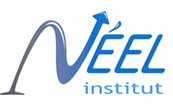- Home
- Institut Néel
- Research teams
- Technical Groups & Services
- Work at the Institut
- Partnerships
Artificial intelligence is an emerging tool that is becoming ubiquitous in X-ray and synchrotron facilities. Mindful of its importance and as part of the upgrade of French CRG beamlines at ESRF, we also wish to discuss how these tools can be useful for us and for the community of scientists working on X-rays or synchrotron techniques. Therefore, we organize a series of webinars (online seminars) dedicated to applications of artificial intelligence (machine and deep learning) to techniques based on x-rays and synchrotrons. The next webinar of this series will be:
In synchrotron tomography, experimental constraints can impose dose and time constraints that leads to noise that carries over into the reconstructed images. Convolutional neural networks (CNNs) have rapidly gained popularity as a powerful tool for removing noise from reconstructed images. However, training CNNs typically requires collecting a dataset of paired noisy and high-quality measurements, which is a major obstacle to their use in practice. To circumvent this problem, we have proposed a method for training deep convolutional neural networks to denoise tomographic reconstructions that does not require any noise-free data. We present results on challenging dynamic micro-tomography and X-ray diffraction computed tomography datasets. In addition, we discuss challenges and provide an outlook on future work.
Bio:
Allard A. Hendriksen received the M.Sc. degree in mathematics from the University of Leiden, Leiden, The Netherlands, in 2017. He is currently pursuing a Ph.D. degree with the Computational Imaging group at CWI, the national research institute for mathematics and computer science in Amsterdam, The Netherlands. The focus of his research is on combining deep learning and tomographic reconstruction algorithms.
The link to connect to the webinar will be sent by e-mail. To receive it, please register for free by clicking here:
https://univ-grenoble-alpes-fr.zoom.us/meeting/register/tJEscuivqDIvH9BeNqzLO8c2v7Ywoxmav-xe
For more information about upcoming webinars on this series, please click here.
